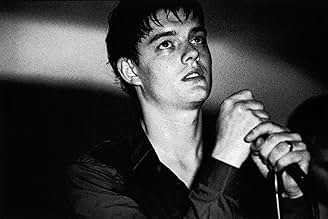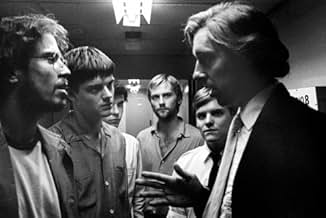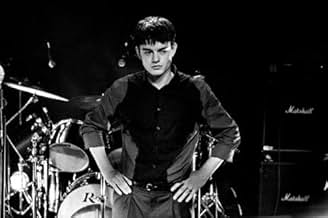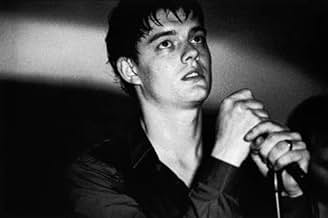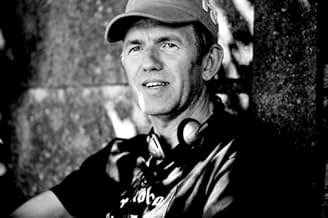IMDb-BEWERTUNG
7,6/10
70.275
IHRE BEWERTUNG
Ein Porträt über Ian Curtis, den geheimnisvollen Sänger von Joy Division, dessen persönliche, berufliche und romantische Probleme dazu führten, dass er mit 23 Jahren Selbstmord beging.Ein Porträt über Ian Curtis, den geheimnisvollen Sänger von Joy Division, dessen persönliche, berufliche und romantische Probleme dazu führten, dass er mit 23 Jahren Selbstmord beging.Ein Porträt über Ian Curtis, den geheimnisvollen Sänger von Joy Division, dessen persönliche, berufliche und romantische Probleme dazu führten, dass er mit 23 Jahren Selbstmord beging.
- Regie
- Drehbuch
- Hauptbesetzung
- 1 BAFTA Award gewonnen
- 31 Gewinne & 35 Nominierungen insgesamt
Martha Myers Lowe
- Ian's Sister
- (as Martha Myers-Lowe)
Mary Jo Randle
- Debbie's Mother
- (as Mary-Jo Randle)
Empfohlene Bewertungen
Control, a biopic about a band from Manchester, is getting serious attention from around the world. Starting with an award in Cannes. That's maybe more than you might expect. Joy Division, a respected band of the 70s, are hardly a name on everyone's lips. And films made by ex music video directors about yet another load of rockers rarely raise eyebrows. So why is this different? Joy Division, for non-initiates, were a post-punk Manchester band of throbbing guitars and dark, doom-laden lyrics. Recognition in the music biz (especially by other musicians) was perhaps even greater after the death of lead singer, Ian Curtis. Control covers a period from his schooldays to his end in 1980 (aged 23). It is based on the biography of his widow.
Control uses Curtis' love of poetry, as well as the more familiar songs-that-tell-a-story device, to provide at least scant insight into the music. "I wish I were a Warhol silkscreen, hanging on the wall," he muses. But what is dealt with in much more detail is his growing sense of isolation, coping with epilepsy as the pressures of touring build up, and the distraught domestic relations he is embroiled in with wife Debbie (Samantha Morton) and romantic-interest-from-afar Annik (Alexandra Maria Lara). "It's like it's not happening to me but someone pretending to be me. Someone dressed in my skin," he says.
In a telling scene when he is under hypnosis, the camera revolves around his head as we hear voices speaking to him. "Ian, let me in, love," says his wife, "there's room to talk." Responsibilities as husband and father. A mistress who is also in love with him. A band and fan following who want more than he can give. From warholian, carefree screen-dream of youth, he has arrived at a place where he doesn't want to be. Drugs and their side-effects no longer a schoolboy's recreational laugh. Prescription bottles grip with morbid fascination. And the knowledge that doctors don't have a cure.
The film carries viewers away with blistering intensity. Relative newcomer Sam Riley plays Curtis with alarming energy. With Samantha Morton, it's not what she says but what you see going through her mind. She contains her expressiveness for the camera to pick up (rather than thrusting it on us). We want to cry inside for her character. As a feat of interiorisation, Control puts her as a contender in the shoes of Meryl Streep.
Supporting cast members come through with believability and sincerity, sparkling with well-honed contrasts. Toby Kebbell, fast-talking manager Rob, lifts us out of the depressive mood with wisecracks enough to make legless monkeys jump. "Where's my £20?" asks a hapless stand-in as Rob deals with an emergency. "In my f*ck-off pocket!" he barks back. Craig Parkinson is record producer and late TV presenter Tony Wilson (to whom the opening screening at the Edinburgh International Film Festival was dedicated). He demonstrates fine shades of teeth-gritting tolerance, explaining to the band, seconds before their first live TV show: yes, 'large dog's c*ck' counts as swearing, and would mean the broadcast is pulled. Established Romanian actress, Alexandra Maria Lara, succeeds in making Annik far more than the two-dimensional bit-of-fluff that would have been an easy course. As potential home-breaker, it is tempting to hate her, yet her character is shown with the intellectual appreciation and chemistry that Debbie can no longer offer.
Morton, in the Q&A after the Edinburgh premiere, links the film to Saturday Night and Sunday Morning. It is the kitchen-sink, downtrodden existence that her Debbie inhabits. Cinematography is also reminiscent of this period, with its careful black-and-white observation of working class streets. I watched it a second time, enjoying careful compositions and suggestive mise-en-scene. But director Anton Corbijn is typically modest. "I really wanted you to look at the actors on the screen and only afterwards at the look of the film." While Ian, in Debbie's eyes, might be the licentious and 'angry young man' of social realism drama, the Control scenes from which she is tormentedly absent show another side: the world experienced by her husband (a reference in the film likens his isolation to Brando's character in Apocalypse Now).
"And we would go on as though nothing was wrong. And hide from these days we remained all alone."
Riley takes on manic expressions as if marching away from an impending epileptic fit while singing Transmission. It is such a potent, almost frightening feat, that we have to shake ourselves to remember he only got the part when he was stuck for a job. "Not a lot was going on in my life before this, so I was appreciative for the work and the money," he tells the opening night audience. "I imagine this will have opened doors for you," I had said to him earlier; he smiled like a man who still can't believe his good luck. But the 'luck' is very well deserved. His 'Ian' is physically and mentally complex. When I had managed to stop him on the Red Carpet long enough to congratulate him, Mr Riley explains that he had a friend who was an epileptic. "I witnessed an attack often enough to be able to copy it."
Although the film has a driving energy that takes our breath away, it drifts a little towards the tragic conclusion. We know the ending and it is a case of waiting for it to happen. And although it features plenty of excellent Joy Division tracks, any music biopic will never be good enough or accurate enough for some fans.
Fortunately this is not just for music fans but for serious film fans as well. It careers in a tightly controlled arc, where music biopic meets cinematic excellence. Why should you see it? "Some people visit the past for sentimental reasons," says Corbijn. "Some people visit the past to understand the present better." Control is not in the sentimental exercise category.
Control uses Curtis' love of poetry, as well as the more familiar songs-that-tell-a-story device, to provide at least scant insight into the music. "I wish I were a Warhol silkscreen, hanging on the wall," he muses. But what is dealt with in much more detail is his growing sense of isolation, coping with epilepsy as the pressures of touring build up, and the distraught domestic relations he is embroiled in with wife Debbie (Samantha Morton) and romantic-interest-from-afar Annik (Alexandra Maria Lara). "It's like it's not happening to me but someone pretending to be me. Someone dressed in my skin," he says.
In a telling scene when he is under hypnosis, the camera revolves around his head as we hear voices speaking to him. "Ian, let me in, love," says his wife, "there's room to talk." Responsibilities as husband and father. A mistress who is also in love with him. A band and fan following who want more than he can give. From warholian, carefree screen-dream of youth, he has arrived at a place where he doesn't want to be. Drugs and their side-effects no longer a schoolboy's recreational laugh. Prescription bottles grip with morbid fascination. And the knowledge that doctors don't have a cure.
The film carries viewers away with blistering intensity. Relative newcomer Sam Riley plays Curtis with alarming energy. With Samantha Morton, it's not what she says but what you see going through her mind. She contains her expressiveness for the camera to pick up (rather than thrusting it on us). We want to cry inside for her character. As a feat of interiorisation, Control puts her as a contender in the shoes of Meryl Streep.
Supporting cast members come through with believability and sincerity, sparkling with well-honed contrasts. Toby Kebbell, fast-talking manager Rob, lifts us out of the depressive mood with wisecracks enough to make legless monkeys jump. "Where's my £20?" asks a hapless stand-in as Rob deals with an emergency. "In my f*ck-off pocket!" he barks back. Craig Parkinson is record producer and late TV presenter Tony Wilson (to whom the opening screening at the Edinburgh International Film Festival was dedicated). He demonstrates fine shades of teeth-gritting tolerance, explaining to the band, seconds before their first live TV show: yes, 'large dog's c*ck' counts as swearing, and would mean the broadcast is pulled. Established Romanian actress, Alexandra Maria Lara, succeeds in making Annik far more than the two-dimensional bit-of-fluff that would have been an easy course. As potential home-breaker, it is tempting to hate her, yet her character is shown with the intellectual appreciation and chemistry that Debbie can no longer offer.
Morton, in the Q&A after the Edinburgh premiere, links the film to Saturday Night and Sunday Morning. It is the kitchen-sink, downtrodden existence that her Debbie inhabits. Cinematography is also reminiscent of this period, with its careful black-and-white observation of working class streets. I watched it a second time, enjoying careful compositions and suggestive mise-en-scene. But director Anton Corbijn is typically modest. "I really wanted you to look at the actors on the screen and only afterwards at the look of the film." While Ian, in Debbie's eyes, might be the licentious and 'angry young man' of social realism drama, the Control scenes from which she is tormentedly absent show another side: the world experienced by her husband (a reference in the film likens his isolation to Brando's character in Apocalypse Now).
"And we would go on as though nothing was wrong. And hide from these days we remained all alone."
Riley takes on manic expressions as if marching away from an impending epileptic fit while singing Transmission. It is such a potent, almost frightening feat, that we have to shake ourselves to remember he only got the part when he was stuck for a job. "Not a lot was going on in my life before this, so I was appreciative for the work and the money," he tells the opening night audience. "I imagine this will have opened doors for you," I had said to him earlier; he smiled like a man who still can't believe his good luck. But the 'luck' is very well deserved. His 'Ian' is physically and mentally complex. When I had managed to stop him on the Red Carpet long enough to congratulate him, Mr Riley explains that he had a friend who was an epileptic. "I witnessed an attack often enough to be able to copy it."
Although the film has a driving energy that takes our breath away, it drifts a little towards the tragic conclusion. We know the ending and it is a case of waiting for it to happen. And although it features plenty of excellent Joy Division tracks, any music biopic will never be good enough or accurate enough for some fans.
Fortunately this is not just for music fans but for serious film fans as well. It careers in a tightly controlled arc, where music biopic meets cinematic excellence. Why should you see it? "Some people visit the past for sentimental reasons," says Corbijn. "Some people visit the past to understand the present better." Control is not in the sentimental exercise category.
For every icon, there is an unknown predecessor who paves the way. Before there was Kurt Cobain, there was Ian Curtis, lead singer of the post-punk band, Joy Division. 27 years after his tragic death, Curtis' incredible contribution to music is finally being recognized in Anton Corbijn's film, "Control." It's only fitting that Corbijn serve as director since it was his early photographs of Joy Division that reflected the band's dark, introspective songs. Corbijn went on to photograph and direct videos for such musical greats as U2, David Bowie, Depeche Mode, R.E.M. and Metallica.
With his first feature film, Corbijn avoids the pitfalls of many music video directors who inundate us with flashy and unnecessary edits and camera angles. Instead, he lets the stark black and white of the film tell the story of a lead singer tortured by epilepsy, guilt, depression and suicidal thoughts. The use of black and white also captures the factory town of Manchester, England in the late 1970s, a city crumbling under industrial and economic stress. Manchester has since rebounded and is once again thriving.
Curtis is played by relative newcomer, Sam Riley, who's quiet and unassuming approach portrays an artist inspired by his heroes, David Bowie and Iggy Pop. At a chance meeting following a Sex Pistols concert, Curtis bonds with three fellow musicians to form the band.
As Joy Division begins to flourish, Ian's relationship with his young wife, Deborah, continues to distance itself. Academy Award nominee, Samantha Morton plays the confused wife trying to understand her husband's depressed soul. The film is based on Deborah Curtis' autobiography, "Touching From A Distance", so it comes as a surprise that Morton's character does not have more scenes in the movie.
The key to Control is understanding Curtis' depression, which the film accomplishes to near perfection. As he battles epilepsy, the young singer lives in constant fear that his next seizure will be his last. His only option is to swallow a daily cocktail of prescription drugs with side effects so terrible, that most of us would rather tempt fate than endure the aftermath of the pills.
Ian's spirit is also tortured by overwhelming guilt brought on by an extra-marital affair with a part-time journalist, played by Romanian-born Alexandra Maria Lara.
The most telling scene comes when Ian records an in-studio track for the song "Isolation." While Curtis stoically sings into the microphone, his band mates are distracted with the normal banter that typically occurs in a studio.
"Mother, I tried, please believe me. I'm doing the best that I can. I'm ashamed of the things I've been put through. I'm ashamed of the person I am." The lyrics seem to fall on deaf ears except for those of the sound engineer who refers to it as "genius." But Ian's brilliance is also a desperate cry for help ignored by everyone in the studio.
The 27-year-old Riley does an excellent job of capturing Curtis' aloofness on stage. Singers such as Jim Morrison, Kurt Cobain and even the early years of Michael Stipe would often drift into the moment of the song. But when Curtis performed, he immersed himself into his own world where the music simply served as the soundtrack. Riley skillfully draws us into Ian's dark world with a range of subtle head movements and facial expressions to a whirling explosion of arm gyrations that came to personify the singer's stage performances.
Overwhelmed with grief, shame and depression, Ian finally succumbs to his demons at the young age of 23. He left behind a wife, a child and a musical legacy that is finally receiving its just rewards nearly three decades later.
For those looking for a story solely about Joy Division, Control may not be for you. But for those seeking an intuitive perspective into the anguished spirit of one of the most influential alternative bands in history, you will certainly find it in this depressing but incredibly beautiful film.
With his first feature film, Corbijn avoids the pitfalls of many music video directors who inundate us with flashy and unnecessary edits and camera angles. Instead, he lets the stark black and white of the film tell the story of a lead singer tortured by epilepsy, guilt, depression and suicidal thoughts. The use of black and white also captures the factory town of Manchester, England in the late 1970s, a city crumbling under industrial and economic stress. Manchester has since rebounded and is once again thriving.
Curtis is played by relative newcomer, Sam Riley, who's quiet and unassuming approach portrays an artist inspired by his heroes, David Bowie and Iggy Pop. At a chance meeting following a Sex Pistols concert, Curtis bonds with three fellow musicians to form the band.
As Joy Division begins to flourish, Ian's relationship with his young wife, Deborah, continues to distance itself. Academy Award nominee, Samantha Morton plays the confused wife trying to understand her husband's depressed soul. The film is based on Deborah Curtis' autobiography, "Touching From A Distance", so it comes as a surprise that Morton's character does not have more scenes in the movie.
The key to Control is understanding Curtis' depression, which the film accomplishes to near perfection. As he battles epilepsy, the young singer lives in constant fear that his next seizure will be his last. His only option is to swallow a daily cocktail of prescription drugs with side effects so terrible, that most of us would rather tempt fate than endure the aftermath of the pills.
Ian's spirit is also tortured by overwhelming guilt brought on by an extra-marital affair with a part-time journalist, played by Romanian-born Alexandra Maria Lara.
The most telling scene comes when Ian records an in-studio track for the song "Isolation." While Curtis stoically sings into the microphone, his band mates are distracted with the normal banter that typically occurs in a studio.
"Mother, I tried, please believe me. I'm doing the best that I can. I'm ashamed of the things I've been put through. I'm ashamed of the person I am." The lyrics seem to fall on deaf ears except for those of the sound engineer who refers to it as "genius." But Ian's brilliance is also a desperate cry for help ignored by everyone in the studio.
The 27-year-old Riley does an excellent job of capturing Curtis' aloofness on stage. Singers such as Jim Morrison, Kurt Cobain and even the early years of Michael Stipe would often drift into the moment of the song. But when Curtis performed, he immersed himself into his own world where the music simply served as the soundtrack. Riley skillfully draws us into Ian's dark world with a range of subtle head movements and facial expressions to a whirling explosion of arm gyrations that came to personify the singer's stage performances.
Overwhelmed with grief, shame and depression, Ian finally succumbs to his demons at the young age of 23. He left behind a wife, a child and a musical legacy that is finally receiving its just rewards nearly three decades later.
For those looking for a story solely about Joy Division, Control may not be for you. But for those seeking an intuitive perspective into the anguished spirit of one of the most influential alternative bands in history, you will certainly find it in this depressing but incredibly beautiful film.
8tmk1
I saw this film last night then I went home and read a lot of the comments here. I think some things have been missed between the glowing reviews and the bitter disappointments.
First, it is a truly beautiful film and I found the acting uniformly excellent. That has already been said plenty of times.
More interesting to me are the comments about this not being an accurate or fair portrait of Ian Curtis and those around him. I've read plenty of accounts that characterize Ian and his band-mates as relentless practical jokers -- the book Torn Apart by Mick Middles and Lindsay Reade is full of these anecdotes. But I also think it's naive to expect a film like this to be anything close to a fair and objective telling of anyone's life. This is a dramatic interpretation, not a documentary.
In addition to the multiple meanings the title has for the characters in the film, this film is itself an exercise in CONTROL: Deborah Curtis's control over her husband's legacy; the surviving band members' control over the public image of Joy Division.
No, the film does not show the laughs and good times the band had, but this is in keeping with all of Joy Division's work. Their entire output as a living band was highly stylized. Almost everything they issued was in stark black and white; their imagery was overwhelmingly bleak and funereal; and they certainly courted controversy with their name and imagery. All of which was very consciously and tightly CONTROLLED by the band and the people at Factory. They gave few interviews and preferred to let the work speak for itself.
My point is that this film simply continues that project. It is yet another highly stylized piece of work in the Joy Division canon. To paraphrase the Tony Wilson remark that has been cited elsewhere in these comments -- when you have the choice between the legend and the facts, go with the legend. Their work has always had an epic, legendary quality. This movie is absolutely in keeping with that aesthetic.
I think it's also worth noting that Corbijn was a participant in shaping the Joy Division legacy from the very start -- his photographs of the band helped shape their image and his video for "Atmosphere" set the tone for how their legacy would be preserved. CONTROL is simply another collaboration with the band and their music. An extension of that original project.
I think that ultimately this film is an excellent piece of work. Just as Joy Division produced music of astonishing beauty and resonance out of the misery of life in post-industrial England, this film turns personal pain and loss into a powerful piece of art.
First, it is a truly beautiful film and I found the acting uniformly excellent. That has already been said plenty of times.
More interesting to me are the comments about this not being an accurate or fair portrait of Ian Curtis and those around him. I've read plenty of accounts that characterize Ian and his band-mates as relentless practical jokers -- the book Torn Apart by Mick Middles and Lindsay Reade is full of these anecdotes. But I also think it's naive to expect a film like this to be anything close to a fair and objective telling of anyone's life. This is a dramatic interpretation, not a documentary.
In addition to the multiple meanings the title has for the characters in the film, this film is itself an exercise in CONTROL: Deborah Curtis's control over her husband's legacy; the surviving band members' control over the public image of Joy Division.
No, the film does not show the laughs and good times the band had, but this is in keeping with all of Joy Division's work. Their entire output as a living band was highly stylized. Almost everything they issued was in stark black and white; their imagery was overwhelmingly bleak and funereal; and they certainly courted controversy with their name and imagery. All of which was very consciously and tightly CONTROLLED by the band and the people at Factory. They gave few interviews and preferred to let the work speak for itself.
My point is that this film simply continues that project. It is yet another highly stylized piece of work in the Joy Division canon. To paraphrase the Tony Wilson remark that has been cited elsewhere in these comments -- when you have the choice between the legend and the facts, go with the legend. Their work has always had an epic, legendary quality. This movie is absolutely in keeping with that aesthetic.
I think it's also worth noting that Corbijn was a participant in shaping the Joy Division legacy from the very start -- his photographs of the band helped shape their image and his video for "Atmosphere" set the tone for how their legacy would be preserved. CONTROL is simply another collaboration with the band and their music. An extension of that original project.
I think that ultimately this film is an excellent piece of work. Just as Joy Division produced music of astonishing beauty and resonance out of the misery of life in post-industrial England, this film turns personal pain and loss into a powerful piece of art.
The first thing that strikes you about 'Control' is its silence, and the chilly beauty of its black and white images. As a still photographer first-time director Anton Corbijn photographed Joy Division in black and white during their short existence. He knows how to get the remorselessly grim feel of the north of England in the late Seventies. (The boys came from the outskirts of Manchester. Joy Division formed in 1976.) This film (there's a documentary just coming out on the band too) is loosely based on a memoir of her marriage by Deborah Curtis, lead singer Ian Curtis' young wife, who had a baby girl by him and then tragically found him after he'd hanged himself in 1980, two months short of his twenty-fourth birthday, just as the band was to tour America for the first time.
'Control's' strength is a certain recessiveness. In the English style, it's offhand and avoids huge dramatic crescendos. That's refreshing. And besides the images and the restraint, the film is worth seeing for the concert sequences. The cast actually plays the Joy Division music live, and Sam Riley, who plays Ian Curtis, not only closely resembles him, but is a riveting and intense, almost at times scary, performer. When he says the public doesn't know how much of himself he puts into his performances, we know what he means.
The film is excellent at showing Ian's dilemmas. The band is a sudden success. He has an attack in their car as the band returns from a gig. Doctors tell him he has a form of epilepsy. He's given a fistful of pills to take every day and told to have early nights and stay off the booze. How faithfully he takes the pills is unclear but he suffers from their side effects in various ways, while late nights and booze are essentials of his existence. It doesn't seem that the English doctors knew very well how to treat him, and he was so busy performing he didn't take the time to go to specialists and have more extensive tests.
Ian had gotten married to Deborah (Samantha Morton) early--too early. On the road he meets a Belgian part-time journalist, Annik Honoré (Alexandra Maria Lara), and they fall uneasily in love. He's not strong enough to decide between the two women. Fear that his disease will only get worse hounds him, and the fits go on. Riley is fascinating to watch as he undergoes an increasingly visible meltdown. Other cast members are cyphers, though Joe Anderson, who has the role of Max in Taymor's Across the Universe, is the lead guitarist. Morton has a drab role but Deborah's unfortunate situation is present as a constant counterpart to Ian's story. The two other important characters are the Manchester music guru Tony Wilson (Craig Parkinson) and the band's wise-guy manager Rob Gretton (Toby Kebbell).
The creative inspiration of the band, the nature of their songs, the cast of their lyrics, the reason why Joy Division is a cult band today when it only existed for four years--these are matters the film is unable to elucidate. Watch it for the cool visuals, for the tall, soulful Sam Riley, and for the terrific live performance scenes. Enjoy the understatement, and the silence. Don't expect more.
Harvey Weinstein has chosen both for Control and for the soon-to-open Todd Haynes Bob Dylan film I'm Not There to have a slowly-unrolling distribution system, and hopes to bestow early cult status on both films by having them premiere at that temple of cinephilia, Film Forum, in lower Manhattan, New York City, and wait for the buzz of the cognoscenti to multiply and spread. It may work. But both films are tough sells. But A.E. Scott of the NYTimes has said Control is "enigmatic and moving, much in the manner of Joy Division's best songs." And that's a good send-off.
'Control's' strength is a certain recessiveness. In the English style, it's offhand and avoids huge dramatic crescendos. That's refreshing. And besides the images and the restraint, the film is worth seeing for the concert sequences. The cast actually plays the Joy Division music live, and Sam Riley, who plays Ian Curtis, not only closely resembles him, but is a riveting and intense, almost at times scary, performer. When he says the public doesn't know how much of himself he puts into his performances, we know what he means.
The film is excellent at showing Ian's dilemmas. The band is a sudden success. He has an attack in their car as the band returns from a gig. Doctors tell him he has a form of epilepsy. He's given a fistful of pills to take every day and told to have early nights and stay off the booze. How faithfully he takes the pills is unclear but he suffers from their side effects in various ways, while late nights and booze are essentials of his existence. It doesn't seem that the English doctors knew very well how to treat him, and he was so busy performing he didn't take the time to go to specialists and have more extensive tests.
Ian had gotten married to Deborah (Samantha Morton) early--too early. On the road he meets a Belgian part-time journalist, Annik Honoré (Alexandra Maria Lara), and they fall uneasily in love. He's not strong enough to decide between the two women. Fear that his disease will only get worse hounds him, and the fits go on. Riley is fascinating to watch as he undergoes an increasingly visible meltdown. Other cast members are cyphers, though Joe Anderson, who has the role of Max in Taymor's Across the Universe, is the lead guitarist. Morton has a drab role but Deborah's unfortunate situation is present as a constant counterpart to Ian's story. The two other important characters are the Manchester music guru Tony Wilson (Craig Parkinson) and the band's wise-guy manager Rob Gretton (Toby Kebbell).
The creative inspiration of the band, the nature of their songs, the cast of their lyrics, the reason why Joy Division is a cult band today when it only existed for four years--these are matters the film is unable to elucidate. Watch it for the cool visuals, for the tall, soulful Sam Riley, and for the terrific live performance scenes. Enjoy the understatement, and the silence. Don't expect more.
Harvey Weinstein has chosen both for Control and for the soon-to-open Todd Haynes Bob Dylan film I'm Not There to have a slowly-unrolling distribution system, and hopes to bestow early cult status on both films by having them premiere at that temple of cinephilia, Film Forum, in lower Manhattan, New York City, and wait for the buzz of the cognoscenti to multiply and spread. It may work. But both films are tough sells. But A.E. Scott of the NYTimes has said Control is "enigmatic and moving, much in the manner of Joy Division's best songs." And that's a good send-off.
Ian Curtis had suffered more than any man should. Like most depressives, he was difficult to be understood by those around him. A teenager living in a Manchester suburbia turned post-punk rocker--lead singer/songwriter for the now infamous Joy Division--married at a young age, father to a child and dead by hanging at 23.
Despite "Control" being made by the stunning music video director and photographer Anton Corbijn, and inspired by the memoir "Touching From a Distance" who was written by his widow Debbie--who also found the body--there is a feeling of distance and isolation to the character. Perhaps his way of keeping people aside was his greatest legacy. Alienation and mystery elevated to an art form without him even trying.
Pretty-boy newcomer Sam Riley also portrays him in a very passive way. His performance might seem effortless, but there is a subdued discipline involved. He is economic with words, the entire movie seemingly happening around him almost independently of whatever he was doing--and let's not forget he is the main character. I am tempted to praise Corbijn for this touch but I feel it came natural given Curtis' absentee nature.
But let's just make this clear--his character is not underdeveloped--on the contrary, Corbijn and Riley fully embrace the enigma of a man who, as this movie efficiently showed us--was not that complicated. He married young, like any teenager swooped by adolescent love. So, it was not surprising when he fell for a Belgian journalist who came to interview the band. Annik Honore (Alexandra Maria Lara) is only there to be his mistress. But she doesn't need to be anything more. Curtis had one of those rare qualities you find in people that they can impress simply by being in your presence--an aura of fascination personified again brilliantly in Riley's subdued discipline.
Love tore him apart. He loved both Debbie and Annik. His inability to choose might've been due to his young age yet due to his depressive nature he gave away an illusion of wisdom beyond his years. Don't get me wrong--the man was a genius. Too smart for his own good, yet he pushed life too far and too fast and soon enough life pushed back. In one particular scene, Annik asked him what everyone was wondering: "I don't feel like I know you". She then proceeded to ask him what his favorite movie was to which he responded with "The Sound of Music" to her surprise--not to mine, though. It was so apparent that Curtis did not care for the rock'n'roll life. He was a simple man who loved music so of course that movie would seem appropriate. He hated playing for the people, debauchery bored him and his "epilepsy dance" wasn't as much of a rock statement as it was him embracing the aforementioned condition of which he suffered heavily from in confusion.
In the end, I must confess that Joy Division was a band I respected more than I actually loved. Their first album was good and a great introduction to rock's potential of catharsis and introspection, yet I loved their second one more. In both, though, Curtis manifested pieces of himself through minimalistic lyrics and his tragic suicide only serves to accelerate their and the band's legendary status.
Despite "Control" being made by the stunning music video director and photographer Anton Corbijn, and inspired by the memoir "Touching From a Distance" who was written by his widow Debbie--who also found the body--there is a feeling of distance and isolation to the character. Perhaps his way of keeping people aside was his greatest legacy. Alienation and mystery elevated to an art form without him even trying.
Pretty-boy newcomer Sam Riley also portrays him in a very passive way. His performance might seem effortless, but there is a subdued discipline involved. He is economic with words, the entire movie seemingly happening around him almost independently of whatever he was doing--and let's not forget he is the main character. I am tempted to praise Corbijn for this touch but I feel it came natural given Curtis' absentee nature.
But let's just make this clear--his character is not underdeveloped--on the contrary, Corbijn and Riley fully embrace the enigma of a man who, as this movie efficiently showed us--was not that complicated. He married young, like any teenager swooped by adolescent love. So, it was not surprising when he fell for a Belgian journalist who came to interview the band. Annik Honore (Alexandra Maria Lara) is only there to be his mistress. But she doesn't need to be anything more. Curtis had one of those rare qualities you find in people that they can impress simply by being in your presence--an aura of fascination personified again brilliantly in Riley's subdued discipline.
Love tore him apart. He loved both Debbie and Annik. His inability to choose might've been due to his young age yet due to his depressive nature he gave away an illusion of wisdom beyond his years. Don't get me wrong--the man was a genius. Too smart for his own good, yet he pushed life too far and too fast and soon enough life pushed back. In one particular scene, Annik asked him what everyone was wondering: "I don't feel like I know you". She then proceeded to ask him what his favorite movie was to which he responded with "The Sound of Music" to her surprise--not to mine, though. It was so apparent that Curtis did not care for the rock'n'roll life. He was a simple man who loved music so of course that movie would seem appropriate. He hated playing for the people, debauchery bored him and his "epilepsy dance" wasn't as much of a rock statement as it was him embracing the aforementioned condition of which he suffered heavily from in confusion.
In the end, I must confess that Joy Division was a band I respected more than I actually loved. Their first album was good and a great introduction to rock's potential of catharsis and introspection, yet I loved their second one more. In both, though, Curtis manifested pieces of himself through minimalistic lyrics and his tragic suicide only serves to accelerate their and the band's legendary status.
WUSSTEST DU SCHON:
- WissenswertesThe actors playing Joy Division learned how to play the songs themselves. So the scenes where the band is playing live is not from tape, but actually the actors playing live.
- PatzerJoy Division is shown performing "Transmission" on Tony Wilson's television show in September 1978, but in reality, they performed "Shadowplay". The performance that is represented in this scene actually took place a year later in September 1979 on the BBC2 program "Something Else", when they performed "Transmission" (a performance which was used as the music video for the song) and "She's Lost Control".
- Zitate
Ian Curtis: Existence. Well, what does it matter? I exist on the best terms I can. The past is now part of my future. The present is well out of hand.
- Crazy CreditsSPOILER: Epilogue: "Ian Curtis died May 18, 1980. He was 23 years old."
- SoundtracksDrive-In Saturday
(David Bowie)
Published by kind permission of Tintoretto Music/RZO Music Ltd/EMI Music Publishing Ltd/Chrysalis Music Ltd © 1973
Performed by David Bowie
Courtesy of RZO Music
Top-Auswahl
Melde dich zum Bewerten an und greife auf die Watchlist für personalisierte Empfehlungen zu.
Details
- Erscheinungsdatum
- Herkunftsländer
- Offizieller Standort
- Sprache
- Auch bekannt als
- Контроль
- Drehorte
- Produktionsfirmen
- Weitere beteiligte Unternehmen bei IMDbPro anzeigen
Box Office
- Budget
- 4.500.000 € (geschätzt)
- Bruttoertrag in den USA und Kanada
- 872.252 $
- Eröffnungswochenende in den USA und in Kanada
- 27.674 $
- 14. Okt. 2007
- Weltweiter Bruttoertrag
- 8.159.996 $
- Laufzeit2 Stunden 2 Minuten
- Farbe
- Sound-Mix
- Seitenverhältnis
- 2.35 : 1
Zu dieser Seite beitragen
Bearbeitung vorschlagen oder fehlenden Inhalt hinzufügen






